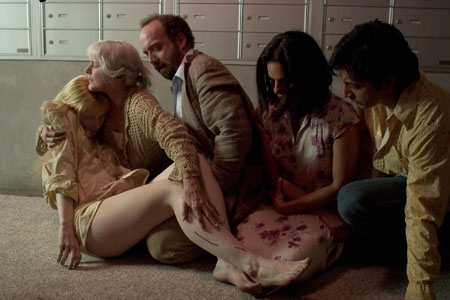Of M. Night Shyamalan‘s handful of movies, the one Roger Ebert reviewed most favorably was “Signs,” and the one he hated, hated, hated was “The Village.” Here’s Ebert’s career overview of the director of “Lady in the Water” and “The Sixth Sense.”
“Wide Awake“ (1998)
The movie is rated PG, a tipoff that it does not end with Joshua taking a tough position in favor of existential nothingness. (It is clever how the movie hides the “sign” in plain view all along.) I wonder who the movie was made for. Smaller kids, I’m afraid, will find it both slow and depressing, especially the parts about why God allows bad things to happen. The health problems of Dave, the best friend, may also come as an unsettling shock. Older kids, on the other hand, are likely to find it too cute, and adults are better advised to see the French film “Ponette,” a more intelligent treatment of a child asking hard questions about heaven.
“The Sixth Sense“ (1999)
I have to admit I was blind-sided by the ending. The solution to many of the film’s puzzlements is right there in plain view, and the movie hasn’t cheated, but the very boldness of the storytelling carried me right past the crucial hints and right through to the end of the film, where everything takes on an intriguing new dimension. The film was written and directed by M. Night Shyamalan, whose previous film, “Wide Awake,” was also about a little boy with a supernatural touch; he mourned his dead grandfather, and demanded an explanation from God. I didn’t think that one worked. “The Sixth Sense” has a kind of calm, sneaky self-confidence that allows it to take us down a strange path, intriguingly.
“Unbreakable“ (2000)
In “Psycho” (1960), Alfred Hitchcock made us think the story was about the Janet Leigh character, and then killed her off a third of the way into the film. No one gets killed early in “Unbreakable,” but Shyamalan is skilled at misdirection: He involves us in the private life of the comic book dealer, in the job and marriage problems of the security guard, in stories of wives and mothers. The true subject of the film is well-guarded, although always in plain view, and until the end, we don’t know what to hope for or fear. In that way, it’s like “The Sixth Sense.” There is a theory in Hollywood these days that audiences have shorter attention spans and must be distracted by nonstop comic book action. Ironic, that a movie about a student of comic book universes would require attention and patience on the part of the audience. Moviegoers grateful for the slow unfolding of “The Sixth Sense” will like this one, too. […]
I mentioned the ending. I was not quite sold on it. It seems a little arbitrary, as if Shyamalan plucked it out of the air and tried to make it fit. To be sure, there are hints along the way about the direction the story may take, and maybe this movie, like “The Sixth Sense,” will play even better the second time–once you know where it’s going. Even if the ending doesn’t entirely succeed, it doesn’t cheat, and it comes at the end of an uncommonly absorbing movie.
“Signs“ (2002)
M. Night Shyamalan‘s “Signs” is the work of a born filmmaker, able to summon apprehension out of thin air. When it is over, we think not how little has been decided, but how much has been experienced. Here is a movie in which the plot is the rhythm section, not the melody. A movie that stays free of labored explanations and a forced climax, and is about fear in the wind, in the trees, in a dog’s bark, in a little girl’s reluctance to drink the water. In signs. […]
At the end of the film, I had to smile, recognizing how Shyamalan has essentially ditched a payoff. He knows, as we all sense, that payoffs have grown boring. The mechanical resolution of a movie’s problems is something we sit through at the end, but it’s the setup and the buildup that keep our attention. “Signs” is all buildup. It’s still building when it’s over.
“The Village“ (2004)
“The Village” is a colossal miscalculation, a movie based on a premise that cannot support it, a premise so transparent it would be laughable were the movie not so deadly solemn. It’s a flimsy excuse for a plot, with characters who move below the one-dimensional and enter Flatland. M. Night Shyamalan, the writer-director, has been successful in evoking horror from minimalist stories, as in “Signs,” which if you think about it rationally is absurd — but you get too involved to think rationally. He is a director of considerable skill who evokes stories out of moods, but this time, alas, he took the day off.
Critics were enjoined after the screening to avoid revealing the plot secrets. That is not because we would spoil the movie for you. It’s because if you knew them, you wouldn’t want to go. The whole enterprise is a shaggy dog story, and in a way, it is all secrets. I can hardly discuss it at all without being maddingly vague. […]
To call it an anticlimax would be an insult not only to climaxes but to prefixes. It’s a crummy secret, about one step up the ladder of narrative originality from It Was All a Dream. It’s so witless, in fact, that when we do discover the secret, we want to rewind the film so we don’t know the secret anymore.












